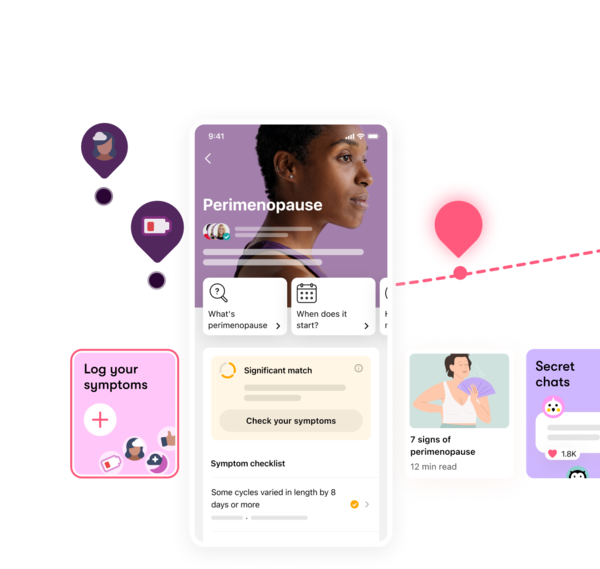Perimenopause is the transition to menopause. Here’s why it happens, what to look out for, and where to go for support with symptoms if you need it.
-
Tracking cycle
-
Getting pregnant
-
Pregnancy
-
Help Center
-
Flo for Partners
-
Anonymous Mode
-
Flo app reviews
-
Flo Premium New
-
Secret Chats New
-
Symptom Checker New
-
Your cycle
-
Health 360°
-
Getting pregnant
-
Pregnancy
-
Being a mom
-
LGBTQ+
-
Quizzes
-
Ovulation calculator
-
hCG calculator
-
Pregnancy test calculator
-
Menstrual cycle calculator
-
Period calculator
-
Implantation calculator
-
Pregnancy weeks to months calculator
-
Pregnancy due date calculator
-
IVF and FET due date calculator
-
Due date calculator by ultrasound
-
Medical Affairs
-
Science & Research
-
Pass It On Project New
-
Privacy Portal
-
Press Center
-
Flo Accuracy
-
Careers
-
Contact Us
What is perimenopause? Everything you should know


Every piece of content at Flo Health adheres to the highest editorial standards for language, style, and medical accuracy. To learn what we do to deliver the best health and lifestyle insights to you, check out our content review principles.
Are you experiencing sudden hot flashes at random times throughout the day or night sweats when you’re trying to sleep? How about irregular periods, a feeling of forgetfulness, mood swings, or sleep issues? If so, you could be experiencing perimenopause, the natural transition to menopause.
You’ve probably heard about menopause but might be wondering what exactly perimenopause is. Confusingly, the two terms are often used interchangeably, even though they mean different things.
Put simply, perimenopause is the years leading up to menopause (your last period). A doctor can diagnose you as having gone through menopause when you haven’t had a period for 12 months. This usually occurs between the ages of 45 and 55, but the average age is 51 in the United States. From that day on, you are postmenopausal.
However, this process doesn’t just happen immediately. That’s where perimenopause comes in. Perimenopause begins somewhere between your late 30s and 50s, but most often in your 40s, on average around 47 years old.
And it’s a totally normal life stage. As Dr. Ruth Arumala, obstetrician and gynecologist, Texas, US, puts it, “Perimenopause isn’t a condition. It’s not a disorder. It’s a phase of life, just like puberty when you start having periods.” Let’s learn more about it.
Key takeaways
- Perimenopause refers to the years leading up to menopause.
- It tends to start between the ages of 45 and 55.
- Perimenopause signs include changes to your periods, hot flashes and night sweats, mood swings, and sleep problems (all the things lots of us associate with menopause).
- Some people have difficulty with symptoms, while others don’t, but there are numerous treatment options available that can help.
Take a quiz
Find out what you can do with our Health Assistant
What is perimenopause?
Perimenopause is the years of transition into menopause and usually lasts around four to eight years.
So, what’s happening to your body during perimenopause? Basically, your hormone production begins to change. In particular, the levels of estrogen produced by your ovaries start to fluctuate, meaning that they could go up and down. It’s this erratic estrogen production that can cause those telltale perimenopause symptoms, such as changes to your cycle, mood swings, and brain fog.
When your estrogen levels are low, you could experience hot flashes and night sweats. When they are high, you may experience breast tenderness and an irregular menstrual flow. Know that you don’t need to cope with these symptoms alone. There’s support and treatment available from your doctor.
When does perimenopause start?
For most of us, perimenopause begins in our 40s, but it can start anytime between our late 30s and 50s. Symptoms might start earlier for Black women, and they might experience them for longer. The average age for a woman to reach menopause in the United States is 51.
"Perimenopause isn’t a condition. It’s not a disorder. It’s a phase of life, just like puberty when you start having periods"
How long does perimenopause last?
Perimenopause lasts for four years on average, but this time frame will vary from person to person. Some people might only experience it for a few months, while others could have symptoms for up to eight years.
Causes of perimenopause
We now know that perimenopause is a natural life stage (like puberty). It happens when there is a loss of follicular function in the ovaries, meaning they lose the capacity to produce the same amount of hormones as before, leading to a shift in hormone levels.
There are some risk factors that might mean that you start perimenopause earlier in life.
These include smoking, having a family history of early menopause, and certain types of cancer treatment (chemotherapy and pelvic radiation therapy). If you’re concerned that you might be at risk of early menopause, it’s best to reach out to your health care provider for tailored advice.

Symptoms of perimenopause
Everyone is unique when it comes to perimenopause. No two people are going to have the same experience, and you won’t necessarily have difficulty dealing with the symptoms. Nevertheless, knowledge is power, so here’s the lowdown on the most common symptoms.
Remember, help is at hand, so if you find yourself recognizing any of these symptoms, then reach out to your doctor. Lots of these can be managed with a combination of medication, like hormone therapy (HT, also known as hormone replacement therapy or HRT), and lifestyle changes.
Changes to your periods
Cycle variation changes are often one of the early signs of perimenopause. This is because hormonal fluctuations cause ovulation (the moment when one of your ovaries releases an egg) to become less predictable than usual, which then affects your cycle.
So what should you expect? Well, the gaps between your periods might get longer or shorter, and you might start to skip some periods. Your period itself could also become shorter or longer, and your bleeding might be heavier or lighter.
Every woman and person who menstruates is different, which can make it tricky to know whether you’re in perimenopause or not. Using a period-tracking app like Flo can help you keep track of your cycles and spot any changes that you can then share with your doctor.
Hot flashes
You’ve probably heard of these (or experienced them yourself), but what exactly are they? Also known as “vasomotor symptoms,” hot flashes are when you get a sudden feeling of heat that comes out of nowhere. This usually “creeps through your chest, neck, and face,” explains Dr. Arumala.
“You might become red and flushed in your face and neck, especially if you’re light skinned. You might sweat, and you might feel like your heart’s racing. Some people notice a cold chill right afterward.” Getting hot flashes at night when you’re asleep (or trying to be)? You’re looking at night sweats here.
Hot flashes and night sweats are common symptoms of perimenopause, experienced by up to 80% of women. So while they’re undeniably frustrating, you can at least take some comfort in knowing that if you’re experiencing them, you’re certainly not alone.
Sleep issues and fatigue
If a good night’s rest feels elusive right now, then know this: Disrupted sleep is also really common in perimenopause. You might struggle with getting to sleep in the first place, or you might wake up at 3 a.m. and find it impossible to settle. None of that is fun.
So what’s the deal? One possible reason for perimenopause sleep disturbances is that other symptoms, such as night sweats and mood changes, might be affecting your sleep. Another cause could be fluctuating hormones, which can lead to poorer sleep quality than usual.
Roller-coaster moods
When your hormone levels dip and rise in perimenopause, they might take your serotonin (the “feel-good chemical” that helps you feel happy) along for the ride. These fluctuations can lead to feelings of irritability, anxiety, and sadness. Other perimenopause symptoms are also involved here. If your sleep is disrupted, that can send your mood on a downward spiral, too.
What else to look out for
Other signs of perimenopause can include:
- Vaginal dryness
- Bladder sensitivity
- Changes in sex drive
- Struggling to get pregnant
- Changes in your cholesterol levels
Dr. Arumala points out there could be other things causing all of these symptoms. It isn’t always perimenopause. For instance, “Irregular periods could be down to polycystic ovary syndrome, fibroids, endometriosis, stress, or many other reasons,” she says.
If you’re not sure what’s causing your symptoms or if they’re severely interfering with your life, get in touch with your doctor.
How is perimenopause diagnosed?
Your doctor will look at other possible reasons for your symptoms and rule those out. “Diagnosis is based on the fact that you’re in the right age group, you’re seeing changes to your period, and your symptoms aren’t due to something else,” says Dr. Arumala.
One really important thing to keep in mind is that your doctor is unlikely to run tests to check your hormone levels. Why? Well, the most important things in the diagnosis of perimenopause are the symptoms. Hormones can vary a lot at this time, and in most cases, they don’t have much clinical value.
However, they might be helpful in determining a diagnosis of perimenopause or menopause if you don’t have periods due to the use of progesterone intrauterine devices or pills, or if you’ve been through a medical procedure that prevents you from having a period, such as an endometrial ablation or hysterectomy. Checking your hormone levels might also be useful for helping to diagnose something else.
What’s the treatment for perimenopause?
If perimenopausal symptoms are disrupting your life, you don’t just have to put up with them. In fact, there are a number of treatment options available to help you feel like yourself again. These differ according to which symptoms you’re experiencing and how severe they are. Some of the main types of perimenopause treatment include:
- HT or HRT: This can include a combination of estrogen and progesterone for most people or just estrogen, and it is the most effective treatment for hot flashes, night sweats, and vaginal dryness.
- Certain antidepressants are another option to treat hot flashes and night sweats if you can’t take estrogen or have a mood disorder.
- An anti-seizure medication called gabapentin can also relieve hot flashes and night sweats.
- Birth control for perimenopause: If you’re already using hormonal contraceptive pills, then they can be prolonged in the early stages of perimenopause or if you are avoiding pregnancy. These could help to stabilize your fluctuating hormone levels, which in turn could help to decrease perimenopause symptoms.
- Vaginal creams and lubes can provide relief from vaginal dryness or pain during sex.
If you’d like to explore treatment for your symptoms, reach out to your doctor. They can offer advice to help you decide which option is best for you.
How to prepare for entering perimenopause
While you can’t pinpoint exactly when perimenopause is going to happen for you or know how the symptoms might affect you, you can be prepared by going into your menopause transition feeling as healthy as possible.
That means all the usual good stuff like eating well and exercising. Aim to eat a varied diet with lots of fruits, vegetables, and whole grains, and try to squeeze in 30 minutes of exercise (such as brisk walking) most days of the week. It’s also advised that you quit smoking if possible. You might also want to get into the habit of cutting out alcohol and caffeine in the hours before bed, to help boost your sleep if it is disturbed by perimenopause.
Reading up on the symptoms and the changes your body will go through can be helpful, too.
When to see your doctor and what to say
If you’re experiencing perimenopause symptoms and they’re messing with your enjoyment of life, then it’s time to see your doctor. Remember that there are plenty of treatment options out there, so there’s no need to suffer in silence.
And how can you prepare for the appointment? It’s helpful to take a record of your last few menstrual cycles along with you, including details of whether your period has been heavier or lighter than usual. You might also want to make a list of the symptoms you’re experiencing beforehand.
You might also want to ask your doctor about the possible causes of your symptoms, whether you’ll need to take any tests, and the treatment plan they think might work best. It could also be helpful to ask if there are any restrictions you need to know about (such as dietary restrictions) or whether it’s worth seeing a specialist. Remember that perimenopause is a completely normal stage of life, and your doctor is there to help and support you.
More FAQs
Can I get pregnant during perimenopause?
In short: yes. You’re still ovulating (albeit irregularly), so it’s still possible to get pregnant. If that’s not in your life plan, you should use contraception until your doctor has confirmed that you’ve gone through menopause.
What's the difference between premenopause and perimenopause?
Premenopause is the time between your first period and the start of perimenopause. As we’ve learned, perimenopause is the years leading up to menopause when fluctuating hormone levels mean you may get symptoms such as hot flashes and brain fog.
Following this, menopause is when your periods officially stop for good. Your doctor can diagnose you with menopause when you haven’t had a period for 12 months, which will typically occur between the ages of 45 and 55.
What not to eat during perimenopause
There’s no specific perimenopause diet. The main message? It’s all about healthy eating. It’s particularly important to eat foods that are rich in calcium (e.g., milk, yogurt, and kale) to help keep your bones healthy.
This is important because the low levels of estrogen after menopause can weaken your bones, which can lead to osteoporosis (a condition in which your bones become more fragile and easier to break). So having a healthy diet with plenty of calcium and vitamin D and keeping up with regular exercise (especially weight lifting) is important to help prevent this condition.


Hey, I'm Anique
I started using Flo app to track my period and ovulation because we wanted to have a baby.


The Flo app helped me learn about my body and spot ovulation signs during our conception journey.


I vividly
remember the day
that we switched
Flo into
Pregnancy Mode — it was
such a special
moment.
Real stories, real results
Learn how the Flo app became an amazing cheerleader for us on our conception journey.
References
Baker, Fiona C., et al. “Sleep and Sleep Disorders in the Menopausal Transition.” Sleep Medicine Clinics, vol. 13, no. 3, Sep. 2018, pp. 443–56, www.ncbi.nlm.nih.gov/pmc/articles/PMC6092036/.
Casper, Robert F. “Patient Education: Menopause (Beyond the Basics).” UpToDate, 15 Nov. 2022, www.uptodate.com/contents/menopause-beyond-the-basics.
“Exercise for Bones.” Royal Osteoporosis Society, theros.org.uk/information-and-support/bone-health/exercise-for-bones/. Accessed 18 Oct. 2023.
Harlow, Siobán D., et al. “Disparities in Reproductive Aging and Midlife Health between Black and White Women: The Study of Women’s Health Across the Nation (SWAN).” Women’s Midlife Health, vol. 8, no. 1, Feb. 2022, womensmidlifehealthjournal.biomedcentral.com/articles/10.1186/s40695-022-00073-y.
Kim, Chee Jeong, et al. “Influence of Menopause on High Density Lipoprotein-Cholesterol and Lipids.” Journal of Korean Medical Science, vol. 15, no. 4, Apr. 2009, pp. 380–86, https://doi.org/10.3346/jkms.2000.15.4.380.
Lack of Sleep during Menopause Information Leaflet. Liverpool Women’s NHS Foundation Trust, 4 Sep. 2020, www.liverpoolwomens.nhs.uk/media/3540/lack-of-sleep-during-menopause-patient-information-leaflet.pdf.
Lo, Joan C., et al. “Bone and the Perimenopause.” Obstetrics and Gynecology Clinics of North America, vol. 38, no. 3, Sep. 2011, pp. 503–17, www.ncbi.nlm.nih.gov/pmc/articles/PMC3920744/.
“Menopause.” NHS, www.nhs.uk/conditions/menopause/. Accessed 18 Oct. 2023.
“Menopause.” World Health Organization, 17 Oct. 2022, www.who.int/news-room/fact-sheets/detail/menopause.
Nappi, Rossella E., et al. “Global Cross-Sectional Survey of Women with Vasomotor Symptoms Associated with Menopause: Prevalence and Quality of Life Burden.” Menopause, vol. 28, no. 8, May 2021, pp. 875–82, www.ncbi.nlm.nih.gov/pmc/articles/PMC8746897/.
Payne, Jennifer. “Can Menopause Cause Depression?” Johns Hopkins Medicine, www.hopkinsmedicine.org/health/wellness-and-prevention/can-menopause-cause-depression. Accessed 23 Oct. 2023.
“Perimenopausal Bleeding and Bleeding after Menopause.” The American College of Obstetricians and Gynecologists, Oct. 2020, www.acog.org/womens-health/faqs/perimenopausal-bleeding-and-bleeding-after-menopause.
“Menopause 101: A Primer for the Perimenopausal.” The North American Menopause Society, www.menopause.org/for-women/menopauseflashes/menopause-symptoms-and-treatments/menopause-101-a-primer-for-the-perimenopausal. Accessed 18 Oct. 2023.
“Perimenopause.” Cleveland Clinic, my.clevelandclinic.org/health/diseases/21608-perimenopause. Accessed 18 Oct. 2023.
“Perimenopause.” Mayo Clinic, 25 May 2023, www.mayoclinic.org/diseases-conditions/perimenopause/symptoms-causes/syc-20354666.
Pinkerton, Joann V. “Menopause.” MSD Manual Consumer Version, July 2023, www.msdmanuals.com/en-gb/home/women-s-health-issues/menopause/menopause.
“Preparing for Menopause.” NIH News in Health, July 2018, newsinhealth.nih.gov/2018/07/preparing-menopause.
“Symptoms: Menopause.” NHS, www.nhs.uk/conditions/menopause/symptoms/. Accessed 18 Oct. 2023.
“The Change before the Change: Perimenopause Questions.” Penn Medicine, 7 Dec. 2016, www.pennmedicine.org/updates/blogs/womens-health/2016/december/the-change-before-the-change.
“The Menopause Years.” The American College of Obstetricians and Gynecologists, Dec. 2018, www.acog.org/womens-health/faqs/the-menopause-years.
“Things You Can Do: Menopause.” NHS, www.nhs.uk/conditions/menopause/things-you-can-do/. Accessed 18 Oct. 2023.
Weber, Miriam T., et al. “Reconciling Subjective Memory Complaints with Objective Memory Performance in the Menopausal Transition.” Menopause, vol. 19, no. 7, July 2012, pp. 735–41, www.ncbi.nlm.nih.gov/pmc/articles/PMC3773730/.
“What Is Menopause?” National Institute on Aging, www.nia.nih.gov/health/what-menopause. Accessed 18 Oct. 2023.
History of updates
Current version (14 November 2023)
Published (17 January 2024)
In this article

Track your perimenopause journey in the Flo app
-
Log symptoms and get tips to manage them
-
Learn what to expect with expert-led articles and videos
-
Connect with others who can relate to how you're feeling




